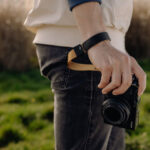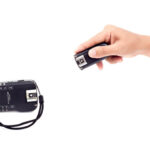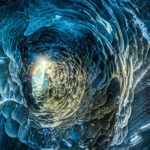In a world where anyone and everyone can take photos, it’s easy to get in the mindset that a camera is camera. But there’s still a big difference between a professional photographer and an amateur one. To put this notion to the test, professional portrait photographer Ben Lucas created the Headshot Challenge to decide once and for all how important it is to use a professional photographer versus a fake one:
For the Headshot Challenge, each person was photographed by both Lucas and paid actress Mary, using the same lighting, setup, and camera options. The goal of the experiment was to show that there’s more to capturing portraits than the technical aspects. To create a great photo, you have to be able to connect with your subject, and each image should bring out the personality and/or emotions of your subject.

Image Comparison of Circus Performer Sarah
Throughout the video, each subject was photographed by both “photographers”. It’s easy to see their techniques were vastly different. While Mary used a more technical approach with terminology you might hear at any large photography studio chain, Lucas offered a more personable approach to help his clients relax in front of the camera.

Real vs. Fake Side by Side Headshots of DJ Becka
After the shoot, the photos were placed side-by-side to see if the subject could tell the difference between the two photographers. Every person photographed was able to decipher between the fake and professional photographs. In fact, during the post-shoot interview, no one was surprised to find out that Mary was a paid actress.
Like This Article?
Don't Miss The Next One!
Join over 100,000 photographers of all experience levels who receive our free photography tips and articles to stay current:






Alex – I didn’t say a photographer had to use manual mode to be a professional, nor did I say they had to be able to be able to relax their client to be a professional. There are many forms of photography you don’t personally interact with the subject. All I said was that in my personal opinion, for a photographer to labeled a professional they needed to UNDERSTAND how to use their camera in manual mode. In no way does that state they need to always use manual mode to take their photos. I know plenty of professional photographers; and while some use automatic settings & have more post processing changes, others use more manual settings with less post processing adjustments. How it is done is all up to the photographer’s preferences.
Actually steveb I’m going to have to stop you there. I never stated only professionals understand what ISO, exposures, etc. are; nor did I say amateur photographers are not capable of taking a good photo. All I said was that in my opinion to be considered a professional photographer you need to know and understand what these aspects are and how to manually use your camera.
No where did I state amateur photographers do not know these principles or that they cannot take a good photo; I just said without this knowledge I do not consider a person able to label themselves a professional.
Most professional photographers I know (and as a designer I know tons!) NEVER use manual mode, but according to your standards they’re not pros. Shame they featured in famous glossy mags … Same goes for “interacting witht the subject”: a lot of pros cannot relax their human subjects, so they’re into other kind of photography. I really don’t understand the meaning of this article? I also want to conclude that all pictures are, well, really crap. Wouldn’t buy one of them, sorry.
Sorry but your article and response indicate you can’t be a really good photographer unless you are a ‘professional’ one.
To bolster your argument you indicate that only ‘professional’ photographers understand aperture, ISO etc etc and spend many years mastering photography – but all that is true of many amateurs, the fact that they do get paid (the definition of amateur) does not detract from their ability.
Equally there are professionals who do not deliver quality work even though they are being paid to do so and no doubt (as the article proves) a professional photographer can create good and bad images of the same subject to order, which really proves nothing.
Correction to previous post
the fact that they do get paid (the definition of amateur) does not detract from their ability.
should read
the fact that they do NOT get paid (the definition of amateur) does not detract from their ability.
I didn’t say amateur photographers were fake; I said there was a large difference between professionals and amateur photographers. The title of ‘Can You Spot the Fake Photographer’ comes from the fact the video uses a paid actress, and not a photographer. However, many of the same points can still pertain to amateur photographers. For instance, someone fresh out college and starting off their career in portrait photography, may have the understanding for capturing pictures, but not the ability to get their subjects to relax.
However, if you are wanting my personal opinion – I feel there are a variety of aspects you need to understand before you can label yourself a professional. For ex. if you are unable to use your camera in manual mode, or are unable to understand how aperture, ISO, etc. effects your photography; than to me, you are not a professional photographer. Professionals spend years mastering not only photography as a whole, but their specialty (ex. landscape, portrait, etc.) as well. Too many people think by purchasing the right equipment will automatically make you a professional, and it takes more than just a high end camera to capture a great a photo.
Interesting video. Takes me back to something I have often said. With the advent of digital photography there are lots of people who buy an expensive camera and then say (now this is an exaggeration for those who don’t understand hyperbole), “Duh, last week I couldn’t even spell photogafer, now I are one!”
If you are trying to make a living at it, this kind of thing makes it difficult. People spend money on this individual, get disappointed, and then don’t have the funds to rehire and get someone who knows what he is doing.
Not knocking the digital world and those who want to buy expensive equipment and take nice pics. But, it takes more than equipment to be a professional. A few months ago on a photographer’s forum I keep up with, someone asked how to get the pics off the internal memory in a Canon DSLR. As it turned out, the camera was to take pics without a memory card, which is for testing purposes, and, of course, there was no internal memory in this camera, thus they shot a wedding (over 100 pics) and there was nothing there. (I think I smell a law suit coming)
Professional photography is hard work, but unfortunately some folks think you are just strolling around pushing the shutter button here and there and everything comes out just fine. NOT!
Okay, so we can see the difference between a professional photographer and a non-photographer. But we haven’t compared a professional photographer to an amateur photographer. You’re comparing apples to oranges when you should be comparing green apples to ripe apples.
I’d also expect to see a difference if you put a professional LANDSCAPE-specialist photographer up against a professional PORTRAIT-specialist photographer. Heck, our country fair has “pro” (more than 50% of income from photography) and “amateur” classes, and sometimes stuff shows up in the “pro” classes that make the amateur stuff look phenomenal!
The comparison was between a professional and an amateur photographer’s procedure to pose and obtain a “good” photograph. The amateur photographer in this example was a paid actress posing as a professional photographer (in other words, faking his or her professionalism) which in no way insinuated that amateurs are fakes, only that they lack the training and experience to bring out the subject’s more natural appearance. Telling someone to smile does not get the same look as interacting with the person and getting him or her to smile. For example, when a person says “cheese” may not get a natural looking smile, but telling them to say another word, like “pickles” when they expect “cheese” may be sufficient for them to think it is humorous and the photographer gets a more natural looking smile. And a more acceptable expression and photograph.
And how exactly are all amateur photographers “fake”?